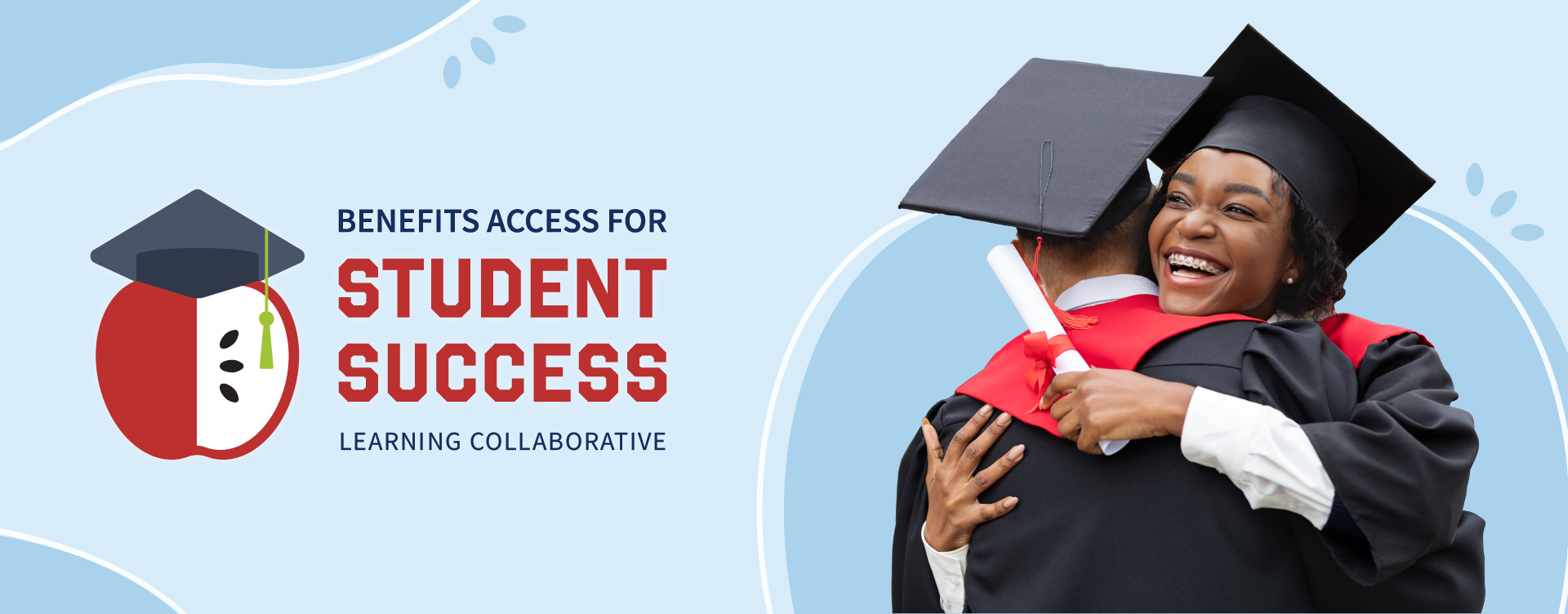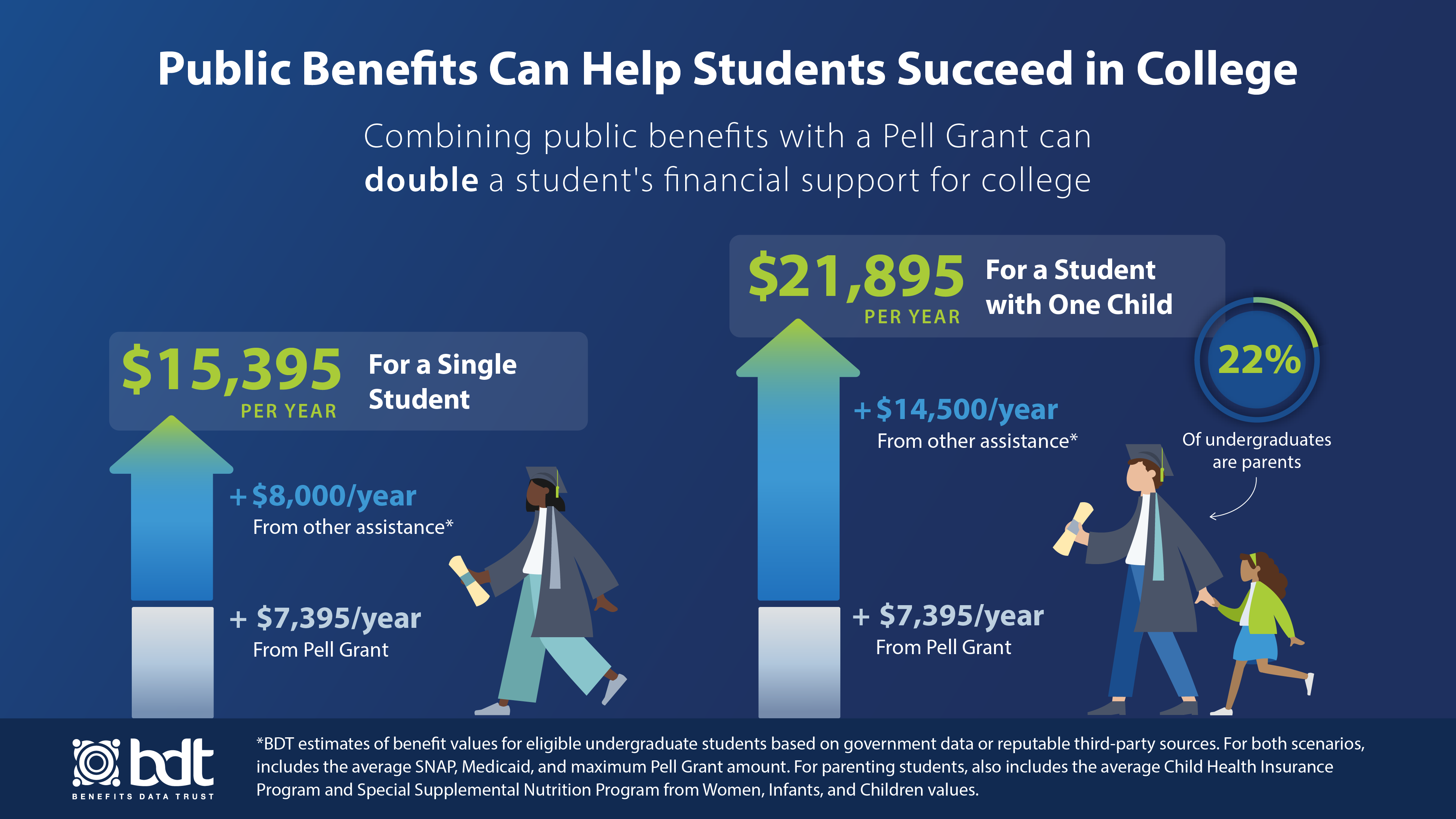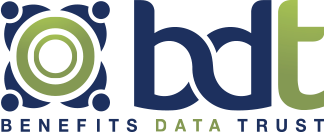
Each year, millions of college students struggle to pay for their basic needs including food and healthcare, yet do not access public benefits that can help meet these needs. An estimated 2 million eligible college students are not currently enrolled in the Supplemental Nutrition Assistance Program (SNAP) even while students struggle with rates of food insecurity greater than the general public. Public benefits offer a sustainable complement to the basic needs work many institutions already engage in. Colleges and universities often employ multiple strategies to address student basic needs insecurity yet aren’t sure who on their campuses could qualify for public benefits like SNAP or Medicaid.
That's why BDT released a toolkit in 2023 to help colleges identify which of their students could be eligible for one of several public benefit programs, and why BDT partners directly with higher ed institutions to develop outreach plans to let students know they could qualify for public benefit programs.
Thanks to support from the Kresge Foundation, Benefits Data Trust (BDT) is accepting applications for a 2024 Learning Collaborative to build the capacity of colleges and universities to connect students to public benefits and help them pay for food, healthcare, and more. The Learning Collaborative is open to higher education institutions in Michigan, North Carolina, Pennsylvania, and South Carolina.
About the Learning Collaborative
Join a cohort of institutions dedicated to enacting a public benefits strategy to support student basic needs security.
Through the Learning Collaborative, BDT will train and coach staff from colleges and universities to conduct effective, data-driven outreach to their students who are likely to be eligible for SNAP, the Special Supplemental Nutrition Program for Women, Infants, and Children (WIC), Medicaid, and the Child Tax Credit (CTC).
Your staff will receive:
- Technical assistance in both a facilitated community of practice and one-on-one coaching
- Opportunities to network and learn from the other participating institutions
- Access to emerging evidence and best practices in student benefits access

Details:
- BDT is offering two fully funded cohort opportunities in 2024, one to run June to November 2024 and a second to run September 2024 to March 2025. Please see a detailed timeline for each cohort below.
- Thanks to support from the Kresge Foundation, there is no cost for colleges to participate. Please review the expectations for participating institutions below.
- In 2024, BDT will launch this program for higher education institutions in Michigan, North Carolina, Pennsylvania, and South Carolina.
- Two-year and four-year nonprofit institutions of higher education are invited to apply. We especially welcome applications from Minority Serving Institutions, HBCUs, and Tribal Colleges.
Expectations for Participating Institutions:
- Have a texting platform available to conduct text message outreach to likely eligible students.
- Designate an internal project coordinator that can spend 2-3 hours per month engaged in this project and lead work across teams that may include: financial aid, institutional research, student services or student affairs, communications or marketing, or other teams that may help craft outreach or implement basic needs work.
- Coordinate with BDT to develop and implement plans to evaluate outcomes where available (e.g., identify numbers of students who received outreach or engaged with resources.)
- Determine (in consultation with BDT) where to refer students for benefit application assistance (e.g., campus or community resources, self-service/online applications, etc.)
How to Apply
- We encourage you to watch the Benefits Access for Student Success Informational Session here.
- For a smooth application experience, review the application checklist below.
- Complete this application by Monday, April 1 to apply to join a 2024 cohort.
- Following your application submission, BDT will communicate selection decisions by April 24.
With any questions about this opportunity, please reach out to highered@bdtrust.org.
This opportunity is open to higher education institutions in Michigan, North Carolina, Pennsylvania and South Carolina. For institutions or systems of higher education in other states, please reach out to highered@bdtrust.org to explore partnership opportunities.
Application Checklist
For a smooth application experience, please have the following information ready when you begin your application.
- Current number of Pell-eligible students enrolled
- Current number students enrolled at the institution
- Summer or fall cohort preference (see timeline below for an outline of each option)
- Name and title of project lead at your institution who will coordinate this work
- Knowledge of whether and how your campus currently connects students to any public benefit programs, such as SNAP or Medicaid (This is not required to participate, but we’d like to understand your context.)
- An understanding of basic needs efforts that are currently underway at your institution (e.g., food pantry, laptop loaner program, emergency aid, partnerships with community agencies to address basic needs, etc.)
- A confirmation that you/your institution can access a texting platform to conduct text message-based outreach to students who are likely eligible for benefits (Other outreach methods may supplement text outreach, but text outreach is required for participation.)
- Name, title, and email of the institutional leader who will sign a Memorandum of Understanding, should your institution be accepted to a cohort. Note: Thanks to the Kresge Foundation, the Learning Collaborative is fully funded in 2024. While no fee is required, we will execute an MOU that outlines expectations for participation and deliverables provided by Benefits Data Trust.
Cohort Timeline
Applicants will be asked to choose their preference of June or September cohort start. Please review the details for each cohort option below to determine what works best for your institution.
I. June through November 2024
Our June cohort is the right option for institutions interested in learning over the summer to conduct benefits outreach this fall. It is a good fit for institutions who use summer sessions to plan and prepare for the academic year immediately following and can move on a prompt timeline to implement an outreach pilot.
- Cohort meets virtually on June 20 and 21 from 12-3 p.m. EST and again for a wrap-up session in November (to be scheduled with cohort).
- Individual consultation with BDT as needed throughout the duration of project for support and coaching.
Project timeline:
| April-May, 2024 | Notification of selection; signing an MOU |
| June 20-21, 2024 | Two half-day virtual trainings on: Project kickoff and goals Using data to identify likely eligible students Crafting effective benefits outreach Evaluation and Action Steps |
| June-October 2024 | Individual consultations with colleges to support outreach planning |
| August-Oct 2024 | Colleges implement outreach on their desired timeline |
| November 2024 | Wrap-up convening: Sharing lessons learned and sustaining the work |
II. September 2024 through March 2025
Our September cohort is the right option for institutions interested in learning over the fall and preparing to conduct outreach early in their Spring semester.
- Cohort meets virtually the 2nd Tuesday of each month from 3-4 p.m. EST beginning in September 2024 through March 2025 for trainings, check-in sessions, and a wrap-up session in March.
- Individual consultation with BDT as needed throughout the duration of project for support and coaching.
Project timeline:
| April-June, 2024 | Notification of selection; signing an MOU |
| September 10, 2024 | Project kickoff and goals |
| October 8, 2024 | Training: Using data to identify likely eligible students |
| November 12, 2024 | Training: Crafting effective benefits outreach (extended to 3-4:30 p.m. for this session) |
| December 10, 2024 | Optional: project check in |
| January 14, 2025 | Outreach planning check in |
| February 11, 2025 | Evaluation planning check in |
| March 11, 2025 | Wrap-up convening: Sharing lessons learned and sustaining the work |
Watch the Benefits Access for Student Success Info Session:
